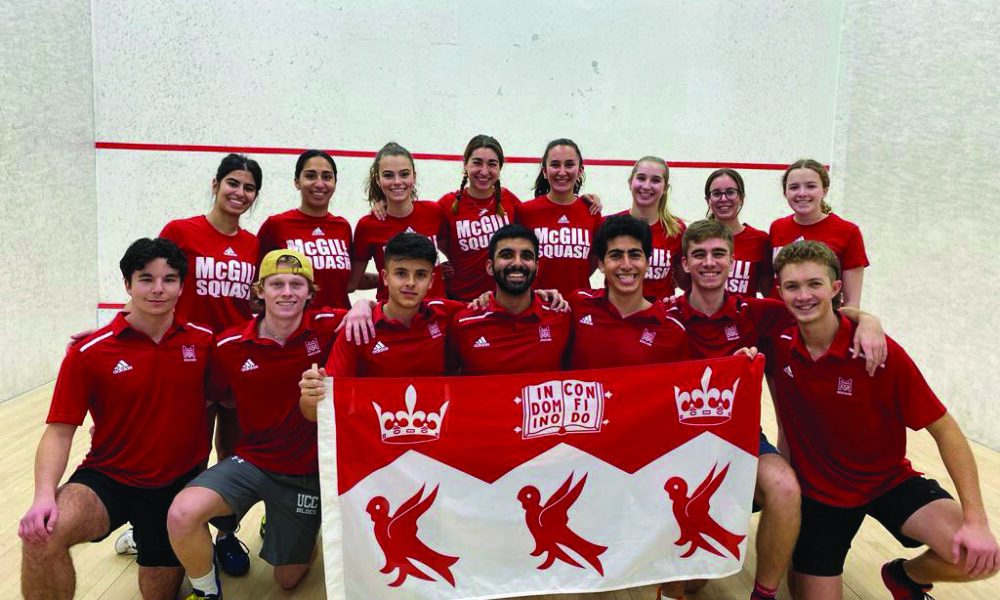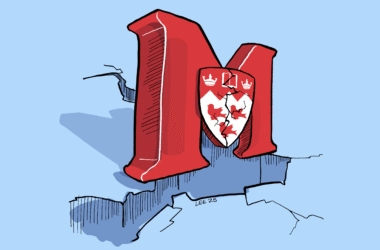On Feb. 12, the Ontario University Athletics (OUA) squash championships took place at Queen’s University, bringing an end to the 2022-23 season. But instead of competing for the men’s and women’s titles in Kingston, the McGill Squash Club was running its weekly Sunday practice here in Montreal.
Despite being one of the best teams in the OUA, McGill’s squash team is not allowed to compete in the league’s championship since they are not an official varsity team––a fact which, according to fourth-year co-captain Matt Bicknell, is affecting the team’s competitiveness.
“When we play in Ontario, we are not allowed to compete in their finals,” Bicknell told The McGill Tribune. “We have to play their C-tier teams which we just obliterate, it’s not even close, so it’s just not worth it to go.”
The Squash Club ceased to be a varsity team after the McGill Athletics system was significantly restructured in the Fall 2010 semester. The change stripped McGill’s intercollegiate clubs of their varsity status, prohibiting them from competing in OUA competitions. Despite competing in the OUA regular season annually (organized by the Ontario Jesters University Squash League), McGill squash has been unable to compete in the OUA championships since 2010. This year, it was an especially bitter pill to swallow for the McGill players considering their success in the regular season, as the women’s and men’s teams placed third and fourth in their respective divisions.
“We need recognition,” said fourth-year co-captain Anika Kurji. “Both the men’s and women’s teams are doing really well, so it’s frustrating that we are not varsity considering that we are competing with all these varsity teams and beating them.”
If McGill squash were to be reinstated as a varsity team, they would potentially be eligible for OUA playing privileges as there is an existing by-law that allows non-Ontario schools to compete in certain sports. This currently allows certain McGill teams like the Redbirds’ hockey team to fully compete in the OUA.
The McGill squash team’s inability to compete is not their only issue, however, as a severe lack of funding poses a serious threat to the team’s future. McGill cut all funding to intercollegiate clubs during the 2010 varsity restructuring, imposing a serious financial burden on the squash team. As a result, the maintenance of McGill’s squash program has become a costly and time-consuming endeavour, as players are responsible for travel expenses and logistics, as well as fundraising.
“We get absolutely no funding from McGill and no help whatsoever, so it’s me and the other captains that do all of the organizing,” said Kurji. “We book hotels, we book train tickets, rent cars, all that stuff, and we have to do it all ourselves.”
“We are always scrounging for money to travel,” Bicknell added.
In addition to travel expenses, the lack of funding has also prevented McGill’s squash team from hiring a professional coach. Instead, the team’s student captains act as coaches by running practices and training the other players to the best of their abilities. The captains are typically the team’s most experienced players and some have prior coaching experience, but the lack of professional training still puts McGill at a disadvantage.
“We have people in the top couple spots on the team who have been playing for years and start to go stagnant, so with the extra professional coaching, it would make a really big difference,” said second-year player Simone Visram.
The lack of professional coaching has also hindered McGill’s ability to recruit top squash players. In fact, of the players interviewed by the Tribune, all stated that squash played a negligible role in their decision to attend McGill. Due to these disadvantages, the team believes a return to varsity status must come sooner rather than later if they are to compete at the highest level.
“Right now I feel like we are performing at a varsity level, we are beating all the other varsity teams in Canada, other than Western and Toronto,” said Biknell. “But that could all change if we don’t have good leadership or funding in the future.”
Only time will tell whether McGill’s squash club will succeed in their venture, but in the meantime, the team is staying focused and training hard as they look to build on their success next season.







